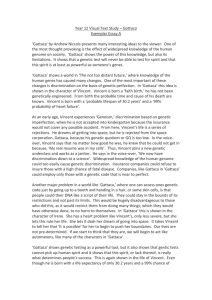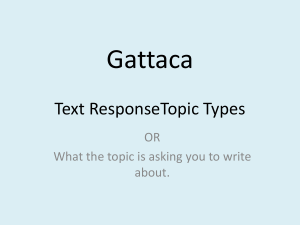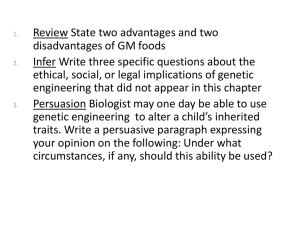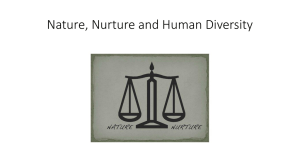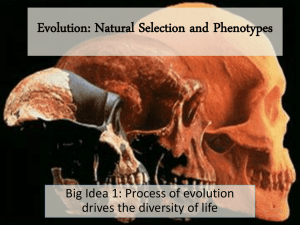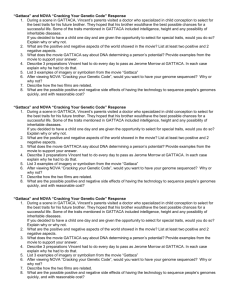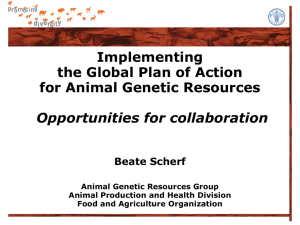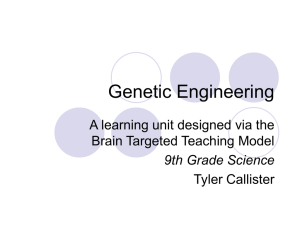essay topics & intros - Mourney-SSS
advertisement
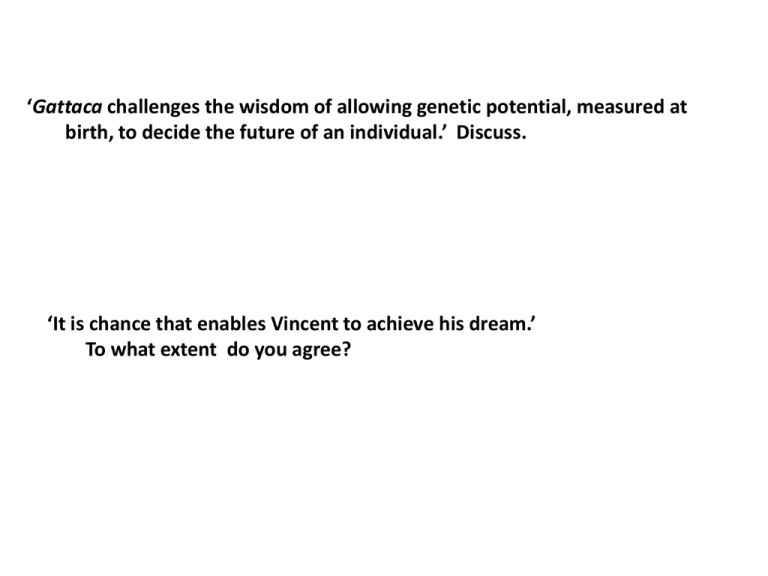
‘Gattaca challenges the wisdom of allowing genetic potential, measured at birth, to decide the future of an individual.’ Discuss. ‘It is chance that enables Vincent to achieve his dream.’ To what extent do you agree? Example Introduction 1 ‘Gattaca challenges the wisdom of allowing genetic potential, measured at birth, to decide the future of an individual.’ Discuss We often try to map out what we are capable of achieving by talking about our potential. With potential comes self-judgment, expectations and often the tendency to compare ourselves with others. Perhaps most dangerous though is that in detailing what we can accomplish, we necessarily define what we can’t. Andrew Niccol’s Gattaca presents an Orwellian technostate where what we can and can’t do is dictated by our genes and ‘no one exceeds their potential’. Ironically though it is this search for genetic flaws itself, which is ultimately flawed. For Vincent exceeding his potential comes with pain, loss and sacrifice. For other characters such as Anton and Eugene we see that not living up to a potential mapped out for you can lead to fear, obsession and bitterness. Even Director Josef acts outside what his genetic profile would have us believe when he murders the Mission Director. Ultimately Gattaca argues that genetic potential is an inaccurate gauge of what humans are capable of and often only serves to damage them. Example Introduction 1 ‘Gattaca challenges the wisdom of allowing genetic potential, measured at birth, to decide the future of an individual.’ Discuss We often try to map out what we are capable of achieving by talking about our potential. With potential comes self-judgment, expectations and often the tendency to compare ourselves with others. Perhaps most dangerous though is that in detailing what we can accomplish, we necessarily define what we can’t. Andrew Niccol’s Gattaca presents an Orwellian technostate where what we can and can’t do is dictated by our genes and ‘no one exceeds their potential’. Ironically though it is this search for genetic flaws itself, which is ultimately flawed. For Vincent exceeding his potential comes with pain, loss and sacrifice. For other characters such as Anton and Eugene we see that not living up to a potential mapped out for you can lead to fear, obsession and bitterness. Even Director Josef acts outside what his genetic profile would have us believe when he murders the Mission Director. Ultimately Gattaca argues that genetic potential is an inaccurate gauge of what humans are capable of and often only serves to damage them. Example Introduction 1 ‘Gattaca challenges the wisdom of allowing genetic potential, measured at birth, to decide the future of an individual.’ Discuss We often try to map out what we are capable of achieving by talking about our potential. With potential comes self-judgment, expectations and often the tendency to compare ourselves with others. Perhaps most dangerous though is that in detailing what we can accomplish, we necessarily define what we can’t. Andrew Niccol’s Gattaca presents an Orwellian technostate where what we can and can’t do is dictated by our genes and ‘no one exceeds their potential’. Ironically though it is this search for genetic flaws itself, which is ultimately flawed. For Vincent exceeding his potential comes with pain, loss and sacrifice. For other characters such as Anton and Eugene we see that not living up to a potential mapped out for you can lead to fear, obsession and bitterness. Even Director Josef acts outside what his genetic profile would have us believe when he murders the Mission Director. Ultimately Gattaca argues that genetic potential is an inaccurate gauge of what humans are capable of and often only serves to damage them. Example Introduction 1 ‘Gattaca challenges the wisdom of allowing genetic potential, measured at birth, to decide the future of an individual.’ Discuss We often try to map out what we are capable of achieving by talking about our potential. With potential comes self-judgment, expectations and often the tendency to compare ourselves with others. Perhaps most dangerous though is that in detailing what we can accomplish, we necessarily define what we can’t. Andrew Niccol’s Gattaca presents an Orwellian technostate where what we can and can’t do is dictated by our genes and ‘no one exceeds their potential’. Ironically though it is this search for genetic flaws itself, which is ultimately flawed. For Vincent exceeding his potential comes with pain, loss and sacrifice. For other characters such as Anton and Eugene we see that not living up to a potential mapped out for you can lead to fear, obsession and bitterness. Even Director Josef acts outside what his genetic profile would have us believe when he murders the Mission Director. Ultimately Gattaca argues that genetic potential is an inaccurate gauge of what humans are capable of and often only serves to damage them. Example Introduction 1 ‘Gattaca challenges the wisdom of allowing genetic potential, measured at birth, to decide the future of an individual.’ Discuss We often try to map out what we are capable of achieving by talking about our potential. With potential comes self-judgment, expectations and often the tendency to compare ourselves with others. Perhaps most dangerous though is that in detailing what we can accomplish, we necessarily define what we can’t. Andrew Niccol’s Gattaca presents an Orwellian technostate where what we can and can’t do is dictated by our genes and ‘no one exceeds their potential’. Ironically though it is this search for genetic flaws itself, which is ultimately flawed. For Vincent exceeding his potential comes with pain, loss and sacrifice. For other characters such as Anton and Eugene we see that not living up to a potential mapped out for you can lead to fear, obsession and bitterness. Even Director Josef acts outside what his genetic profile would have us believe when he murders the Mission Director. Ultimately Gattaca argues that genetic potential is an inaccurate gauge of what humans are capable of and often only serves to damage them. Example Introduction 1 ‘Gattaca challenges the wisdom of allowing genetic potential, measured at birth, to decide the future of an individual.’ Discuss We often try to map out what we are capable of achieving by talking about our potential. With potential comes self-judgment, expectations and often the tendency to compare ourselves with others. Perhaps most dangerous though is that in detailing what we can accomplish, we necessarily define what we can’t. Andrew Niccol’s Gattaca presents an Orwellian technostate where what we can and can’t do is dictated by our genes and ‘no one exceeds their potential’. Ironically though it is this search for genetic flaws itself, which is ultimately flawed. For Vincent exceeding his potential comes with pain, loss and sacrifice. For other characters such as Anton and Eugene we see that not living up to a potential mapped out for you can lead to fear, obsession and bitterness. Even Director Josef acts outside what his genetic profile would have us believe when he murders the Mission Director. Ultimately Gattaca argues that genetic potential is an inaccurate gauge of what humans are capable of and often only serves to damage them. Example Introduction 2 ‘It is chance that enables Vincent to achieve his dream.’ To what extent do you agree? Andrew Niccol’s Gattaca presents a world where excessive social stratification has created a new genetic underclass. Vincent has a singleminded determination to overcome the limitations placed on him by this prejudice. He eventually carries off his amazing subterfuge and challenges his genetic destiny, but it is not only his tenacity and risktaking which allow him to swim away from the shallow end of the gene pool. His help from Lamar, Eugene and Irene and a handful of lucky coincidences remind us that in refusing ‘to play the hand he was dealt’, Vincent relies on the luck of the draw once he has bent the rules. While the film highlights the importance of chance, however, it is by no means absolute on this point. Luck, it suggests, only pays off for Vincent because he also employs important strategies of his own such as: resiting the critique of others; taking risks and working hard for what he believes in and finding personal drive by accepting his own imperfectability. Example Introduction 2 ‘It is chance that enables Vincent to achieve his dream.’ To what extent do you agree? Andrew Niccol’s Gattaca presents a world where excessive social stratification has created a new genetic underclass. Vincent has a singleminded determination to overcome the limitations placed on him by this prejudice. He eventually carries off his amazing subterfuge and challenges his genetic destiny, but it is not only his tenacity and risktaking which allow him to swim away from the shallow end of the gene pool. His help from Lamar, Eugene and Irene and a handful of lucky coincidences remind us that in refusing ‘to play the hand he was dealt’, Vincent relies on the luck of the draw once he has bent the rules. While the film highlights the importance of chance, however, it is by no means absolute on this point. Luck, it suggests, only pays off for Vincent because he also employs important strategies of his own such as: resiting the critique of others; taking risks and working hard for what he believes in and finding personal drive by accepting his own imperfectability. Example Introduction 2 ‘It is chance that enables Vincent to achieve his dream.’ To what extent do you agree? Andrew Niccol’s Gattaca presents a world where excessive social stratification has created a new genetic underclass. Vincent has a singleminded determination to overcome the limitations placed on him by this prejudice. He eventually carries off his amazing subterfuge and challenges his genetic destiny, but it is not only his tenacity and risktaking which allow him to swim away from the shallow end of the gene pool. His help from Lamar, Eugene and Irene and a handful of lucky coincidences remind us that in refusing ‘to play the hand he was dealt’, Vincent relies on the luck of the draw once he has bent the rules. While the film highlights the importance of chance, however, it is by no means absolute on this point. Luck, it suggests, only pays off for Vincent because he also employs important strategies of his own such as: resiting the critique of others; taking risks and working hard for what he believes in and finding personal drive by accepting his own imperfectability. Discussing Film Technique Mentioning film techniques shows your examiner that you understand how the filmmaker has attempted to shape the meanings we make from the film. It shows you understand that a film is a ‘text’. The easiest way to do this is to include a short, simple comment every now and then as you develop your discussion. For example: Vincent is a man held down by his genetic profile, which other people use to judge him. The weight of his genetic imperfections is heard by the amplified sound of his nails dropping in the opening sequence. However, Vincent has more than his genome gives him credit for… Incorporating Quotations Try to use short, simple quotes and integrate them with your own language. For example: Vincent is unable to exceed his potential in the eyes of the society he lives in. ‘My real resume was in my cells.’ Vincent is judged by what his genes predict he is capable of. Vincent is unable to exceed his potential in the eyes of the society he lives in. This is obvious when he laments that he is branded by the ‘resume… in…(his) cells.’ Vincent is judged by what his genes predict he is capable of. • Ellipsis (…) indicates that you have left a word out • If you include a new word yourself put it in parentheses (brackets) •Both of these things can be done so that the quote makes sense in your discussion. •Try to provide a brief context for the quotation. •DO NOT include chapter or page numbers!!! ‘Gattaca challenges the wisdom of allowing genetic potential, measured at birth, to decide the future of an individual.’ Discuss. ‘It is chance that enables Vincent to achieve his dream.’ To what extent do you agree? Gattaca suggests that in opting for a future of genetic manipulation, we are giving up what it means to be human. Do you agree?
